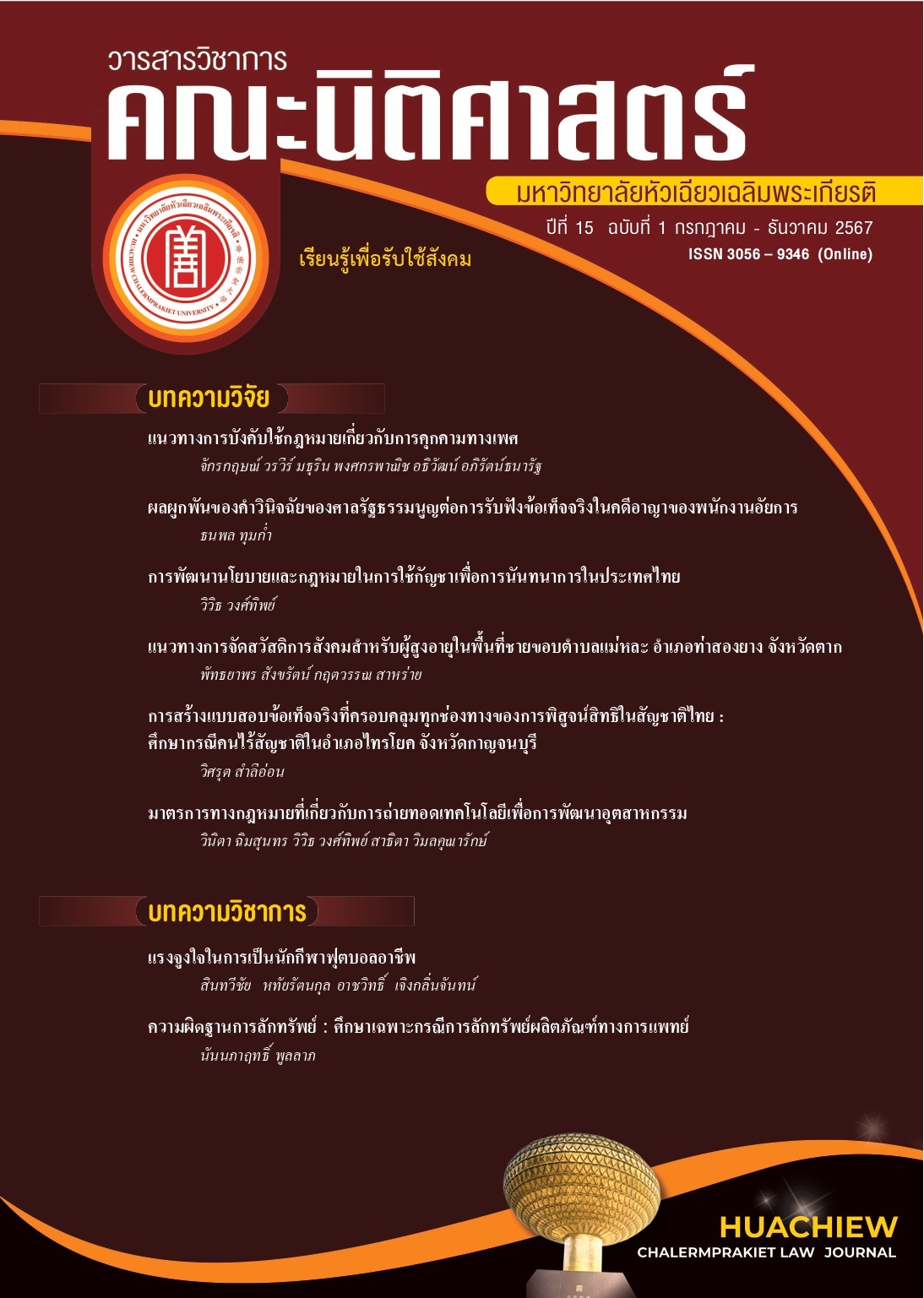แรงจูงใจในการเป็นนักกีฬาฟุตบอลอาชีพ
คำสำคัญ:
แรงจูงใจ, นักฟุตบอลอาชีพบทคัดย่อ
บทความวิชาการ เรื่องแรงจูงใจกับการเป็นนักฟุตบอลอาชีพ แรงจูงใจ เป็นกระบวนการที่บุคคลถูกกระตุ้นจากสิ่งเร้าโดยจงใจให้กระทำหรือ ดิ้นรนเพื่อให้บรรลุจุดประสงค์บางอย่างซึ่งจะเห็นได้พฤติกรรมที่เกิดจากการจูงใจเป็นพฤติกรรมที่มิใช่เป็นเพียงการตอบสนองสิ่งเร้าปกติธรรมดา มีนักกีฬาจำนวนน้อยที่สามารถเข้าสู่การเป็นนักกีฬาฟุตบอลอาชีพที่ประสบผลสำเร็จในชีวิตได้ มีการศึกษาว่ามีเยาวชนเพียง 180 คนจาก 1.5 ล้านคนทั่วประเทศอังกฤษจะสามารถประสบความสำเร็จในการเป็นนักฟุตบอลอาชีพในทีมสโมสรพรีเมียร์ลีกอังกฤษได้ มีเพียงร้อยละ 0.012 ซึ่งสะท้อนให้เห็นถึงปัญหาและอุปสรรคของการก้าวผ่านการเป็นนักฟุตบอลอะคาเดมี่สู่นักฟุตบอลอาชีพอย่างเต็มตัว การก้าวเข้าสู่นักกีฬาฟุลบอลอาชีพ พระราชบัญญัติส่งเสริมกีฬาอาชีพ พ.ศ. 2556 กล่าวว่า กีฬาอาชีพ ตามมาตรา 4 “กีฬาอาชีพ” หมายความว่า กีฬาที่จัดการแข่งขันอย่างเป็นระบบตามมาตรฐานสากลและมีนักกีฬาเข้าร่วมการแข่งขัน โดยมีรายได้จากการแข่งขัน ตามชนิดหรือประเภทที่คณะกรรมการประกาศกำหนด ส่วน “นักกีฬาอาชีพ” หมายความว่า ผู้ซึ่งเล่นกีฬาอาชีพเป็นอาชีพ จากทฤษฎีที่เกี่ยวข้องกับแรงจูงใจ แรงจูงใจใฝ่สัมฤทธิ์ และความต้องการ เป็นการกระทำ หรือพฤติกรรมในแต่ละบุคคลซึ่งถูกกระตุ้น ผลักดันหรือโน้มน้าวให้แสดงออกมาอย่างมีทิศทางเพื่อให้บุคคลกระทำการเพื่อให้บรรลุเป้าหมายตามที่ต้องการ อาจเป็นแรงจูงใจภายในและแรงจูงใจภายนอก โดยเป็นสภาวะของบุคคลที่มีหรือไม่มีความต้องการจะกระทำบางสิ่งบางอย่างที่ต้องอาศัยแรงจูงใจภายใน คือ ความปรารถนาความต้องการจากภายในตนเอง นอกจากนี้ จะเห็นได้ว่าแรงจูงใจและเป้าหมายของชีวิตเป็นแรงจูงใจใฝ่สัมฤทธิ์เป็นปัจจัยที่สำคัญของการเรียนรู้เพราะแรงจูงใจใฝ่สัมฤทธิ์จะเป็นแรงจูงใจที่ทำให้บุคคลมีความมุ่งมั่นในการพยายามที่จะทำให้สำเร็จ โดยแรงจูงใจและเป้าหมายเหล่านี้เป็นพื้นฐานที่นักวิชาการด้านจิตวิทยากีฬาได้นำมาเป็นทฤษฎีพื้นฐานในการประกอบความเข้าใจและศึกษาถึงปัจจัยที่ส่งผลต่อความสำเร็จของนักกีฬาในช่วงของการก้าวขึ้นสู่การเป็นนักฟุตบอลอาชีพ ส่วนความเข้มแข็งทางจิตใจ เป็นความสามารถในการดูแลและควบคุมตัวเอง ด้านความสามารถทางสังคม ด้านความสามารถในการแก้ไขปัญหา ความมุ่งมั่นตั้งใจในการประสบความสำเร็จในชีวิต แสดงให้เห็นถึงความรู้สึกภาคภูมิใจในตนเอง การสามารถควบคุมแรงผลักดันจากภายในและภายนอกของตนเองได้ มีความเห็นอกเห็นใจ เข้าใจ และใส่ใจผู้อื่น เคารพในความเป็นตัวตนและสิทธิ์ของผู้อื่น เป็นความสามารถในการคิดแยกแยะอย่างมีเหตุผลและถูกต้อง เป็นความสามารถในการสร้างแรงจูงใจเพื่อให้ตนเองบรรลุเป้าหมาย ความกระตือรือร้น มุ่งมั่นพยายามเพื่อให้ประสบความสำเร็จในการดำเนินชีวิตหรือการเป็นนักฟุตบอลอาชีพ
เอกสารอ้างอิง
กรมสุขภาพจิต, คู่มือสร้างสรรค์พลังใจให้วัยทีน (Strong Together) (นนทบุรี: บียอนด์ พับลิสชิ่ง จำกัด, 2562).
กระทรวงการท่องเที่ยวและกีฬา, แผนยุทธศาสตร์สร้างกีฬาไทยสู่ความเป็นเลิศ (พ.ศ.2553-2559)(กรุงเทพฯ: กระทรวงการท่องเที่ยวและกีฬา, 2553).
จันทรานี สงวนนาม, ทฤษฎีและแนวปฏิบัติในการบริหารสถานศึกษา (นนทบุรี: บุ๊คพอยท์, 2553).
เทิดทูล โตคีรี, ปัญญา สังขวดี และทวีทรัพย์ เขยผักแว่น, “รูปแบบการพัฒนาศูนย์ฝึกนักกีฬาฟุตบอลเยาวชนของสโมสรฟุตบอลอาชีพ” (2560) 23:1 วารสารมนุษยศาสตร์ละสังคมศาสตร์ (สทมส.).
สมุทร ชำนาญ, ภาวะผู้นำทางการศึกษา ทฤษฎี และปฏิบัติ (ระยอง: พี.เอส. การพิมพ์, 2556).
สินทวีชัย หทัยรัตนกุล และ อาชวิทธิ์ เจิงกลิ่นจันทน์., “การระบุปัจจัยที่มีอิทธิพลต่อการพัฒนานักฟุตบอลอาชีพ: กรณีศึกษาเยาวชนอะคาเดมี่ฟุตบอลเยาวชนทีมชลบุรี เอฟซี” (2566) 1:1 วารสารการจัดการกีฬา (กรุงเทพมหานคร).
อภิพร เป็งปิง, ความเข้มแข็งทางใจ (Resilience) (20 กรกฎาคม 2655) OJED <https://so01.tci- thaijo.org/index.php/OJED/article/view/184416>.
Alderfer, Clayton P., A New Theory of Human Needs Organizational Behavior and Performance (New York: Mc Graw – Hill, 1979).
Cote, J., “The influence of the family in the development of talent in sports” (1999) 13:4 The Sport Psychologist.
Domjan, M., The Principles of Learning and Behavior (New York: Haper and Row, 1996).
Ericsson, K.A., Krampe,R.T., & Tesch-Romer, C, “The role of deliberate practice in the acquisition of expert performance” (1999) 100:3 Psychological Review.
Holt, N. L., & Dunn, J. G. H., “Toward a grounded theory of the psychosocial competencies and environmental conditions associated with football success” (2004) 16:2 Journal of Applied Sport Psychology.
Jarosz, O, Report on Youth Academies in Europe (2 July 2022) ecaeurope <http://www.ecaeurope.com/about-eca/eca-youth-report/>.
Kidd, J.R., How Adults Learn (Chicago: Association Press, 1973).
Lovell, R.B., Adult Learning (New York: Haper and Row, 1980).
McClelland, David C. and Others, The Achievement Motive (New York: Sappleton Century Croffs, Inc, 1953).
McClelland D.C., Human Motivation (New York: Cambridge University. Press, 1978).
Maslow, A. H., Motivation and personality (New York: Harper & Row,1970).
Samut Chamnan., Educational leadership, theory and practice (Rayong: P.S. Printing).
Mills, A., Butt, J., Maynard, I.W., & Harwood, C., “Identifying factors perceived to influence the development of elite football academy scholars
ดาวน์โหลด
เผยแพร่แล้ว
รูปแบบการอ้างอิง
ฉบับ
ประเภทบทความ
สัญญาอนุญาต
ลิขสิทธิ์ (c) 2024 วารสารวิชาการคณะนิติศาสตร์ มหาวิทยาลัยหัวเฉียวเฉลิมพระเกียรติ

อนุญาตภายใต้เงื่อนไข Creative Commons Attribution-NonCommercial-NoDerivatives 4.0 International License.
บทความหรือข้อความคิดเห็นใด ๆ ที่ปรากฏในวารสารฉบับนี้เป็นวรรณกรรมของผู้เขียนโดยเฉพาะ คณะนิติศาสตร์มหาวิทยาลัยหัวเฉียวเฉลิมพระเกียรติ และกองบรรณาธิการไม่มีส่วนรับผิดชอบหรือไม่จำเป็นต้องเห็นด้วยกับข้อคิดเห็นนั้น แต่ประการใด








